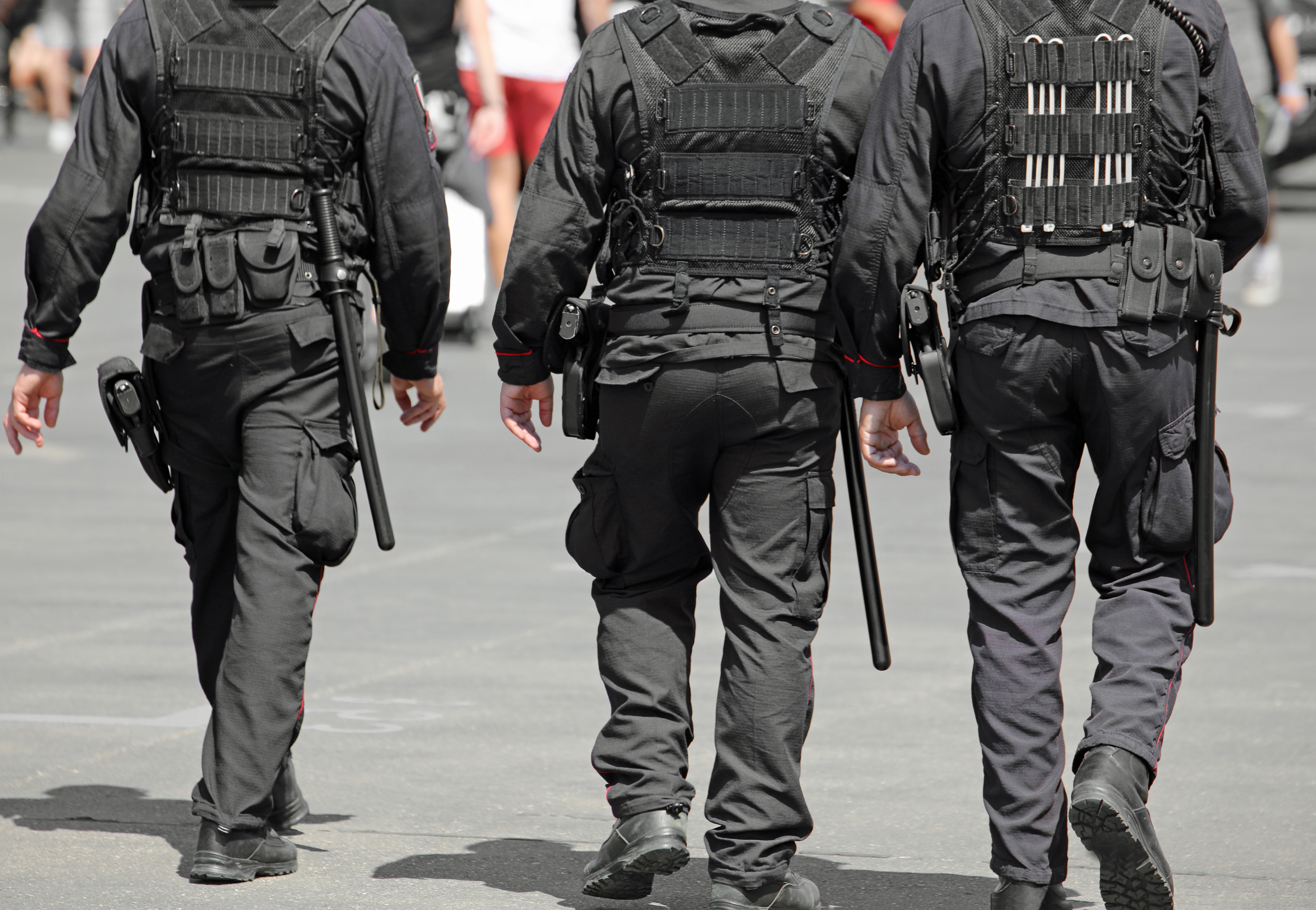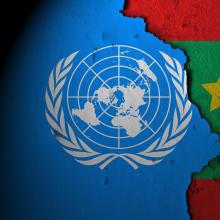June 04, 2025

©Shutterstock: ID 1683817939
1. Abstract
Across the Middle East and North Africa (MENA), states have weaponised the fight against terrorism to suppress peaceful dissent, silence political opposition, and target human rights defenders and civil society. Counter-terrorism laws, measures and rhetoric are continuously employed to commit widespread abuses, including arbitrary detention, torture, unfair trials, executions, and in the most severe cases, to commit a genocide.
In this context, the abuse of administrative counter-terrorism measures is of significant concern for the protection and human rights and fundamental freedoms. Drawing on its documentation and research, MENA Rights Group has identified that such measures are often imposed without due process and in violation of international human rights law. These measures are often used to silence political critics, bypass fair trial guarantees, and expand executive authority without oversight.
This briefing paper illustrates the abuse of administrative counter-terrorism measures in the MENA region, highlighting Algeria’s arbitrary travel bans against Hirak activists; Kuwait’s retroactive stripping of citizenship from political opponents; Israel’s use of the Unlawful Combatants Law to detain Palestinians from Gaza without charges; and the UAE’s listing of peaceful dissidents as terrorists.
This report was submitted in response to a call for input by the United Nations Special Rapporteur on the promotion and protection of human rights and fundamental freedoms while countering terrorism. It aims to inform his forthcoming thematic report on the human rights impacts of administrative measures to counter terrorism and (violent) extremism, to be presented to the UN General Assembly in October 2025.
2. Travel bans in Algeria
In recent years, the Algerian authorities have stepped up their use of travel bans, known as ISTN or interdiction de sortie du territoire national, as an instrument of political control and a means of repression, particularly in the context of the crackdown on the Hirak pro-democracy movement. This alarming trend reflects a deliberate policy on the part of the authorities to restrict the freedom of movement of individuals perceived as critical.
This practice has far-reaching implications for those targeted, who are denied the exercise of a number of rights, including the right to leave any country, including their own. In many cases, travel bans are imposed without any prior notification, with the person concerned discovering the ban when crossing a border point. The person concerned is then faced with a legal vacuum, unable to appeal due to the absence of any document confirming the very existence of a travel ban.
Regarding Algeria’s legal framework governing travel bans, the right to leave national territory is recognised as a constitutional right. Article 49 of the Algerian constitution provides that “[e]very citizen shall have the right to choose freely his place of residence and to move freely within the national territory. They are guaranteed the right to enter and leave the national territory. Any restriction on these rights may only be ordered for a specific period by a reasoned decision of the judicial authority.”
However, the Algerian Code of Criminal Procedure departs from the content of article 49 of the Constitution.
According to article 36 bis 1 of the Code of Criminal Procedure as modified by Ordinance no. 15-02 of 2015, “[t]he public prosecutor may, for the purposes of the investigation, on the basis of a reasoned report from the judicial police officer, order a travel ban on any person against whom there is evidence giving rise to a presumption of his probable involvement in a crime or offence. The travel ban […] takes effect for a period of (3) months, renewable once only. However, in the case of terrorism or corruption offences, the ban may be renewed until the end of the investigation. The lifting of the ban on leaving national territory is ordered in the same way.”
As such, the Code of Criminal Procedure does not provide for a travel ban notification system, nor does it require a judicial authority to give reasons for a travel ban decision. In fact, it is only the public prosecutor, who do not generally qualify as judicial officers capable of reviewing the lawfulness of the travel ban, who decides to place a person under a travel ban, on the basis of a report from a criminal investigation police officer.
Additionally, article 36 bis 1 offers no possibility for an effective appeal against the issue of a travel ban. The law does not provide for any procedure for requesting the cancellation of a travel ban, or even its verification by a judicial or administrative authority. A person subject to a travel ban, or ISTN, issued by the public prosecutor can request its removal by appealing directly to that same prosecutor or to the Attorney General. In the case of formal travel ban, or ISTN, the affected person must attach a copy of it to their request. If no travel ban exists and the person is being restricted from traveling, they can file a complaint for unlawful restriction of freedom under article 107 of the Penal Code, which states that “any public official who orders or commits an arbitrary act that infringes on individual freedom or civil rights of citizens faces a prison sentence of 5 to 10 years.”
Importantly, while the Constitution requires that any restriction on the right to leave the national territory must be imposed for a specified period, article 36 bis 1 of the Code of Criminal Procedure provides that the ban may be extended until the investigation is completed in the case of crimes related to corruption or terrorism, rendering the duration of a travel bans issued on their basis de facto uncertain and indefinite.
Algeria’s definition of terrorism, contained in article 87 bis of the Penal Code, has long garnered widespread criticism for its lack of compliance with international standards. The definition, encompassing acts targeting “state security,” “national unity,” and “territorial integrity,” was notably criticised by the Human Rights Committee as “overly broad and vague” and for “allow[ing] for the prosecution of actions that might constitute exercise of the freedom of expression or peaceful assembly.”
At the time of writing in May 2025, a draft law amending the Code of Criminal Procedure is pending before the Algerian National People's Assembly. The provision relating to travel bans, appearing in article 49 of the draft law rather than article 36 bis 1 in the current text, introduces the offense of “undermining State security” to the existing exception clause concerning terrorism or corruption offenses. If adopted, this amendment would further broaden the grounds of issuance of travel bans with indefinitely renewable durations, on the basis of an additional overly vague and broadly worded notion raising similar concerns as Algeria’s widely criticised definition of terrorism.
In 2021, eight activists and former members of the National Committee for the Liberation of Detainees, a group established during the Hirak protest movement to document arrests and prosecutions and to support people detained for their opinions or activism, were placed under arbitrary travel bans. All eight had been charged with “inciting an unarmed gathering,” “insulting public officials,” “receiving funds to commit acts likely to undermine state security,” and “belonging to a terrorist organisation” under article 87 bis of the penal code. In June 2021, an Algiers investigative judge placed them under judicial supervision and imposed a travel ban including seizure of their passports. On 18 November 2022, all defendants in the case were acquitted, but the activists have been unable to retrieve their passports.
On 31 January 2024, the acquittal was upheld on appeal and the defense requested the return of the activists’ passports. However, the public prosecutor replied that the judgment was not yet final and noted that it had been appealed to the Supreme Court. A response from the Supreme Court could take years, restricting their ability to travel outside the country for the long term.
3. Citizenship stripping in Kuwait
In Kuwait, authorities have been escalating political repression following the new Emir’s decision to dissolve the recently elected parliament in May 2024, a dissolution which could last up to four years, and to suspend certain constitutional provisions. In this context, amendments to national legislation have rendered Kuwait’s legal framework more restrictive and allowed for the imposition of administrative measures on security grounds, including citizenship stripping.
Of particular concern are recent amendments to Kuwait’s 1959 Nationality Law. Among them, modified article 13 adds conditions for administrative [i.e., government decision, not a legal process with right of contestation] citizenship revocation. The new provision notably provides that Kuwaiti nationality may be revoked by decree for “individuals convicted for crimes of honour, trust, state security, or offenses against religious sanctities or the Amir.” Another provision was included to strip individuals and their relatives of their citizenship “in case authorities see an infringement on the state higher interest or external security.”
Although the amendments only entered into force in December 2024 when Decree-Law No. 116/2024 was published in the Official Gazette, they had already been approved by the Cabinet on 24 September 2024, and started to be enforced and applied retroactively. This violates the nulla poena sine lege principle enshrined in article 32 of the Kuwaiti Constitution, which provides that “[n]o crime and no penalty may be established except by virtue of law, and no penalty may be imposed except for offences committed after the relevant law has come into force.”
Decisions to revoke citizenship are made by Kuwait’s Supreme Committee to Investigate Kuwaiti Citizenship, a governmental body chaired by Sheikh Fahad Yusuf Saud al-Sabah, First Deputy Prime Minister, Minister of Defence, and Minister of Interior. The Committee’s decisions are not subject to judicial oversight or appeal, and are merely brought for approval before the Cabinet.
In practice, Kuwait’s 1959 Nationality Law has long been used to revoke nationalities as a tool to crackdown on dissent, and the Kuwaiti government has considerably accelerated citizenship stripping in recent months. It was reported that over 35 000 individuals lost their citizenship between August and January 2025, and that nearly 42,000 Kuwaiti nationals had been stripped of their nationality between September 2024 and March 2025. The concerning practice has continued to occur this year, with the Committee approving the citizenship revocation of 3,856 individuals in January 2025, of 476 individuals in February 2025, of 464 individuals in March 2025, of 962 individuals in April 2025, and of 434 individuals in May 2025.
As Kuwait does not recognise dual citizenship, this mass campaign of citizenship stripping risks leaving hundreds or thousands of individuals stateless, in a country that already marginalises the “Bidoon” (stateless) community, with many more expecting to face difficulties obtaining civil documents or having access to education and healthcare, as well as seeking employment.
Other recent concerning measures infringing on fundamental rights and freedoms include the compulsory collection of biometrics from citizens and residents ordered in 2023, allegedly to “bolster the country’s national security architecture,” without any law or regulation to ensure the respect of individuals’ right to privacy. Even more concerning is the fact that Kuwaiti authorities plan on sharing biometric data with other members of the Gulf Cooperation Council (GCC) as part of a “regional security network.”
In February 2025, nine human rights organisations denounced the Kuwaiti government’s campaign of mass citizenship stripping and recent amendments to its Nationality Law, and called on the authorities to immediately suspend citizenship stripping until the Nationality Law is fully amended and aligned with international human rights standards and international best practice. They also called on Kuwaiti authorities to reinstate the nationality of all those who lost it without due process and the possibility to challenge the withdrawal before a court.
4. Administrative detention of Palestinians by Israel
Israeli authorities have systematically and widely used their Unlawful Combatants Law to detain thousands of Palestinian residents of Gaza since October 2023.
The Unlawful Combatants Law allows the Israeli authorities to detain Palestinian residents of Gaza on suspicions of engagement in hostilities against Israel, posing a threat to Israel’s security or belonging to a terrorist organisation, based on undisclosed evidence. The law allows Israeli authorities to bring Palestinian residents of Gaza before Israeli civil courts under the pretence of a legal process that is neither fair nor consistent with international standards of due process, and to be detained without charges for indefinitely renewable periods.
UN Special Procedures, including the mandate of the Special Rapporteur on counter-terrorism and human rights, have repeatedly raised concerns about the Unlawful Combatants Law’s lack of compliance with international standards, including in November 2023, May 2024, and following a country visit in November 2007. The concerning human rights implications of the application of the Unlawful Combatants Law by Israeli authorities have also been highlighted by the UN Working Group on Enforced or Involuntary Disappearances. Gaza-based human rights organisation Al Mezan Center for Human Rights has described the Unlawful Combatants Law as an “apartheid law” specifically designed to detain Palestinian residents of Gaza without charges.
Among key areas of concern, the Unlawful Combatants Law defines an “unlawful combatant” as a person who took part in hostilities against the State of Israel, whether directly or indirectly, or who is a member of a force carrying out hostilities against the State of Israel, and who does not satisfy the conditions granting a prisoner of war status under international humanitarian law, as set out in Article 4 of the Third Geneva Convention. According to the reasoning of the Israeli Supreme Court, it is not essential for someone to take part in hostilities against the State of Israel, as being a member of a “force carrying out hostilities,” or belonging to a “terrorist organisation,” suffices in order to fall within the definition of “unlawful combatant.”
The mandate of the Special Rapporteur on counter-terrorism and human rights expressed concern over the law’s definition of an “unlawful combatant,” notably regarding the lack of definition of “indirect” participation in hostilities, which gives rise to concerns about inconsistency with the principle of legality and the risk of abuse. Regarding the definition’s reference to belonging to a “terrorist organisation,” Israel’s definition of terrorism has been criticised by UN Special Procedures for being vague and overbroad and for failing to satisfy the legal requirements set out by international human rights law.
The Israeli Supreme Court asserted that the status of “unlawful combatant” would amount to a “sub-category of civilians” under international humanitarian law. However, the term “unlawful combatant” carries no recognised status under international humanitarian law, neither does any sub-category of civilian.
Another area of concern stemming from the Unlawful Combatants Law is that it presumes that the release of someone defined as an “unlawful combatant” would “harm state security as long as the hostile acts of that force against the State of Israel have not ceased, unless proven otherwise.”
The Special Rapporteur on counter-terrorism and human rights underlined that the very presence of the term “presumption” in the Unlawful Combatants Law is inconsistent with the requirements of legality, certainty and precision necessary for laws governing detention, sows real doubts about the application of the law, and should be repealed.
According to the Israeli Supreme Court, this presumption applies only after the state proves that the detainee satisfies the statutory definition of “unlawful combatant.” To determine this, the Court held that “the state is liable to prove, with clear and convincing administrative evidence,” that even without direct or indirect participation in hostilities, the detainee belonged to a terrorist organisation and made a significant contribution to the cycle of hostilities, justifying administrative detention to prevent return to such hostilities.
The Court noted that “this requirement is not always easy to prove […] because of the manner in which terrorist organizations work and the manner in which people join their ranks”, adding that “proving that someone belongs to an organization as aforesaid is not always an easy task.”
Lastly, a key issue concerns the applicability of the Unlawful Combatants Law to Palestinian residents of Gaza. According to the Israeli Supreme Court, an “unlawful combatant” status can only be applicable to a “foreign party.” The court held that since the Israeli military ended its rule in Gaza in September 2005, as part of what it termed “disengagement” from Gaza, “the Gaza Strip is no longer under the effective control of the State of Israel”, and Gaza is therefore “no longer held under belligerent occupation”. The Israeli Supreme Court concluded that “the inhabitants of the Gaza Strip constitute foreign parties who may be subject to the Unlawful Combatants Law”.
Contrary to what the Israeli Supreme Court has held, Gaza is and has remained under the military occupation of Israel since June 1967. Israel’s occupation of Gaza is widely recognised by the international community, including the UN and the ICRC, which consider the occupied Palestinian territory (oPt) as comprising Gaza and the West Bank, including East Jerusalem. This position was recently confirmed again by the Special Rapporteur on counter-terrorism and human rights in his communication on the Unlawful Combatants Law dating from May 2024, as well as by the International Court of Justice (ICJ) in its ruling of 19 July 2024.
Given Israel’s ongoing belligerent occupation, Palestinian residents of Gaza cannot be considered as “foreign parties” according to the reasoning of the Israeli Supreme Court. Therefore, Israel’s practice of applying their Unlawful Combatants Law to detain Palestinian residents of Gaza is inherently arbitrary, and should immediately be ended.
As of April 2025, according to Israeli human rights organisation HaMoked, the Israel Prison Service (IPS) was holding nearly 9,792 Palestinians under the classification of “security” detainees and prisoners, including 1,747 held under the Unlawful Combatants Law. These figures do not account for Palestinian detainees taken from Gaza who are held by the Israeli military in facilities operating outside the authority of the IPS. In the explanatory notes accompanying the latest extension of the amendment to the Unlawful Combatants Law adopted in March 2025, Israeli authorities disclosed that they are holding approximately 3,500 individuals as “unlawful combatants.” This figure, significantly higher than the number reported by the IPS, indicates that the majority of Palestinians held under the Unlawful Combatants Law are not detained in regular prison facilities operated by the IPS, but rather in military detention camps administered by the Israeli military authorities. In April 2025, the Public Committee Against Torture in Israel and Hamoked reported that around 6,800 Palestinians are detained by Israel outside the regular criminal justice process, and approximately 3,436 were captured in Gaza and are held as “unlawful combatants”.
Among Palestinian detainees from Gaza is Dr. Hussam Abu Safiya, one of the most prominent Palestinian doctors in Gaza and director of Kamal Adwan Hospital, who is currently detained under Israel’s Unlawful Combatants Law. The Special Rapporteur on Palestine addressed two communications on his case, in January 2025 and February 2025, to the Israeli government, but received no response. As reported by the Special Rapporteur as well as human rights organisations, Israel’s targeted attacks on medical facilities and health care workers contributes to the decimation and collapse of Gaza’s healthcare system, which is a component of Israel’s genocide on Gaza.
UN experts have continued to urge Israel and its allies to end the genocide.
5. Terrorism listing in the United Arab Emirates
In the United Arab Emirates (UAE), terrorism listing or designation poses serious human rights concerns, in law and in practice. The legal framework for terrorism listing can be found in article 63 of the UAE’s 2014 counter-terrorism law. As highlighted by UN Special Procedures, this provision allows the executive branch to designate individuals and entities as terrorists without any corresponding legal requirement to demonstrate the objective basis of the claim, “in the apparent absence of any clear procedure for exercising this power, or oversight over it.” The law also criminalises communication with designated “terrorists” and imposes penalties up to life in prison, leaving designated individuals’ UAE-based relatives at risk of long prison terms for merely communicating with them. Terrorism listing also results in immediate asset freezes and property confiscations.
Importantly, terrorism listing in the UAE relies upon the country’s national definition of terrorism, criticised by UN Special Procedures, including the mandate of the Special Rapporteur on counter-terrorism and human rights, for failing to define the term terrorism directly, instead referring to “terrorist purpose” and “terrorist result”, which “essentially remain undefined, as one definition refers or defers to another without clearly providing a concrete and constrained definition of the activities they encompass”.
In January 2025, Emirati authorities announced a cabinet decision unilaterally adding 11 political dissidents and their relatives, as well as eight companies they own, to its terrorism list for their alleged links to the Muslim Brotherhood.
According to the findings of Human Rights Watch, all eight companies are solely registered in the United Kingdom and are owned or previously owned by exiled Emirati dissidents or their relatives. At least nine of the 11 designated individuals are political dissidents or their relatives. Two of the 11 have been convicted or accused of a terrorist offense: one was convicted in absentia as part of the grossly unfair “UAE94” mass trial of political dissidents in 2013, and the other was accused in a separate case related to supporting the “UAE94” detainees.
The authorities did not inform the affected individuals or entities prior to the designation, nor was there any opportunity to respond to or contest the allegations. Individuals on the list found out about the designation only after WAM, the Emirates News Agency, published it on its website.
None of the listed individuals and companies are included on global terror and financial sanctions lists, including the United Nations Global Sanctions list, the European Union Sanctions list, and the Consolidated List of Financial Sanctions Targets in the UK.
Individuals impacted by the listing have stated that the designation has negatively affected their careers and personal finances, and that it has become harder to get in touch with their families, with some having been completely unable to reach their families since the listing.
Three companies are registered to Ahmed al-Nuaimi, an exiled Emirati dissident included in the “UAE94” and “UAE84” mass trials, and himself listed as terrorist by the UAE in 2021. One of the three companies owned by al-Nuaimi is Cambridge Education and Training Centre, which offers education training courses to educators and parents as well as camps for children and youth. Al-Nuaimi has stated that the designation has harmed his business.
Another company included in the January 2025 listing is Future Graduates Ltd., an entity which helps to facilitate university applications for students wanting to study in the UK. Mohammed Saqr al-Zaabi, an exiled Emirati dissident who was also included in the “UAE94” and “UAE84” mass trials and listed as a terrorist in 2021, was a director and owner of the company from July 2015 to September 2021. In September 2021, he sold his shares and has had no relationship with the company since then. Al-Zaabi has stated that he believes Future Graduates Ltd. was designated because of his previous connection with the company.
6. Conclusion and recommendations
In conclusion, and in light of the above-mentioned considerations, we believe that in the context of the Special Rapporteur’s thematic report on the human rights impacts of administrative measures to counter terrorism to be presented to the UN General Assembly in October 2025, and more broadly on the Special Rapporteur’s thematic focus on administrative measures, it would be highly important to:
- Call on Algerian authorities to align the practice of travel bans with international standards, in law and in practice, to repeal the counter-terrorism legislation or to align it with international standards, and to cease using counter-terrorism laws and measures to crackdown on civic space;
- Call on the Kuwaiti authorities to immediately suspend citizenship stripping until the Nationality Law is fully amended and aligned with international human rights standards and international best practice, and to reinstate the nationality of all those who lost it without due process and the possibility to challenge the withdrawal before a court;
- Call on Israeli authorities to cease arbitrarily applying their Unlawful Combatants Law to Palestinian residents of Gaza, to whom the law is not applicable, to repeal their counter-terrorism legislation or to align it with international standards, and to cease using counter-terrorism laws, measures and rhetoric to justify committing human rights abuses against Palestinians, and genocide in Gaza;
- Call on the Emirati authorities to immediately remove terrorism designations or listings, to provide reparations to those whose human rights and fundamental freedoms have been negatively impacted by the practice, and to repeal their counter-terrorism legislation or to align it with international standards.






